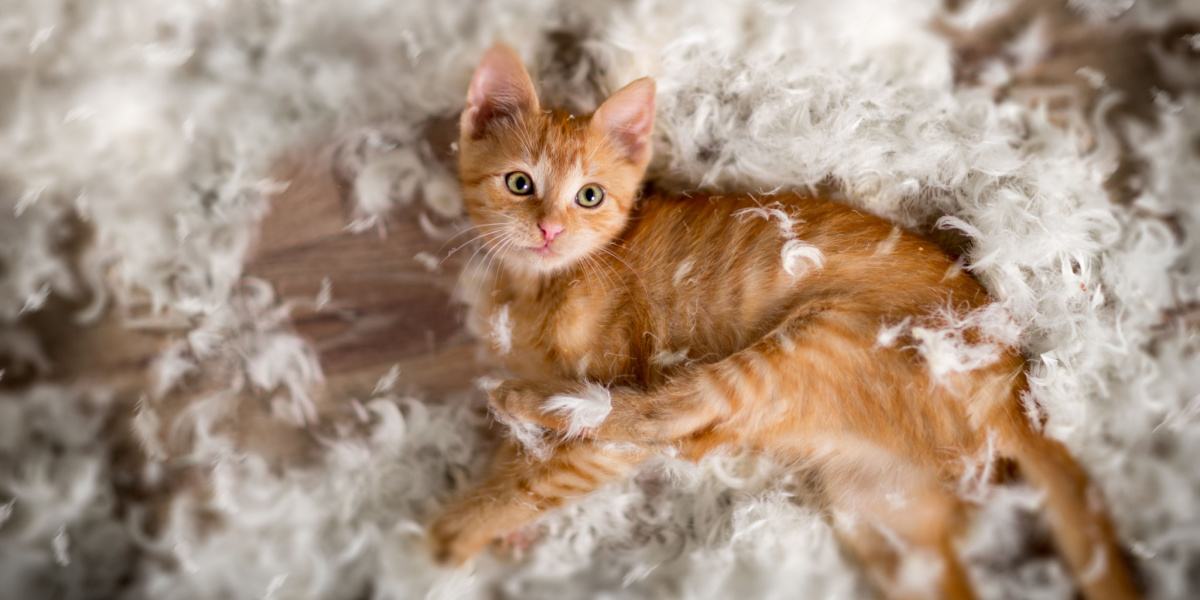
Most cat owners prefer their cats to be calm, relaxed companions, soothing us as they purr in our laps. We also want our cats to be active when appropriate, entertaining us at playtime as they run and jump around our homes.
But sometimes this activity can become excessive. When a cat is meowing and vocalizing, running around at top speed, knocking items off shelves, jumping up and down from surfaces, and being hyperactive, it can be an overwhelming nuisance.
These bursts of energy that cats display are sometimes known as the “zoomies,” or “the mad half hour.” This article will explain what causes this to happen, and how to calm hyperactivity in cats.
Why Some Cats Are So Hyperactive
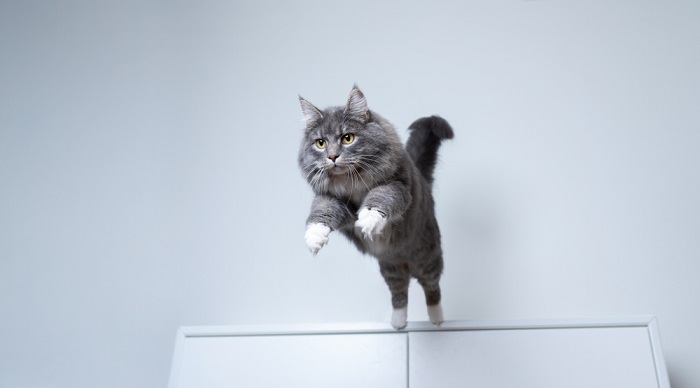
There are a variety of reasons a cat may be more hyperactive, from boredom to illness, to age and disposition.
Most cats are typically calm in behavior and most cats also have bouts of hyperactivity. This is within the normal spectrum of cat behavior. There are a number of reasons why this hyperactivity can become more agitated and prolonged. Examples include:
- Illnesses – such as hyperthyroidism caused by a tumor on the thyroid gland.
- Boredom – If cats have nothing to do, they become bored and this can come out through periods of extended hyperactivity.
- Genetics – Some cats are more hyperactive than others, and their offspring are likely to also be hyperactive.
- Age – Younger cats are more likely to be hyperactive than adult cats or slower, older cats.
- Diet – Cats can become hyperactive around food, whether before, during, or sometimes after eating.
- Hormones – Female cats can be hyperactive when in season, and male cats can be hyperactive if they detect a female cat in season.
Also Read: Cat toys for hyperactive cats
Tips To Calm Hyperactivity In Cats
1. Check For Illnesses
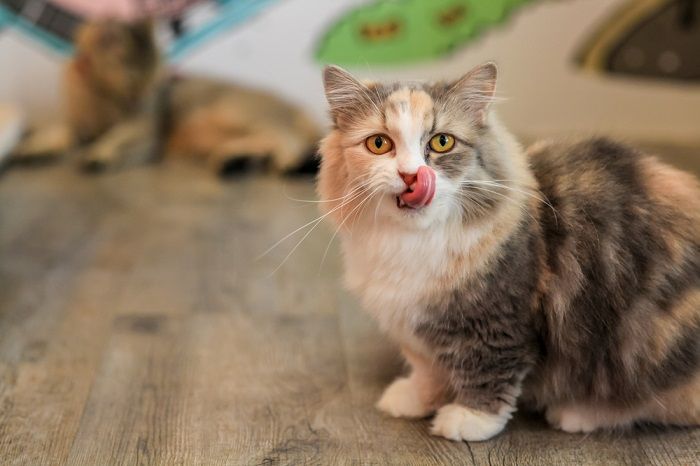
A hyperactive cat that can’t seem to calm down may be a sign of a serious health issue.
Some health problems, especially hyperthyroidism, can cause an increased level of activity in cats. This illness can be easily diagnosed after an examination by a veterinarian, checking for physical signs such as weight loss and a rapid heart rate. This will typically be followed up with a blood test if indicated.
If a diagnosis of an overactive thyroid is made, effective treatment is available. It makes sense that any hyperactive cat should be examined by a veterinarian, to ensure that there is no underlying illness contributing to the hyperactivity.
Also Read: Best Cat Food For Hyperthyroidism
2. Neuter/Spay
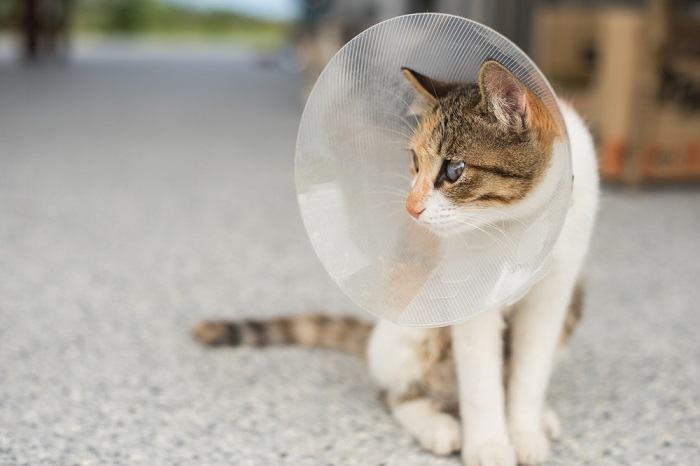
When cats are spayed and neutered, they tend to calm down more naturally.
Testosterone can make male cats more active, and when a female cat is in season, estrogen will make her behave differently. For this reason, if you have a hyper kitten, neutering male cats and spaying female cats when they reach four or five months of age can help to calm them.
Also Read: How Much Does It Cost Spay or Neuter A Cat?
3. Use Pheromone And Herbal Diffusers
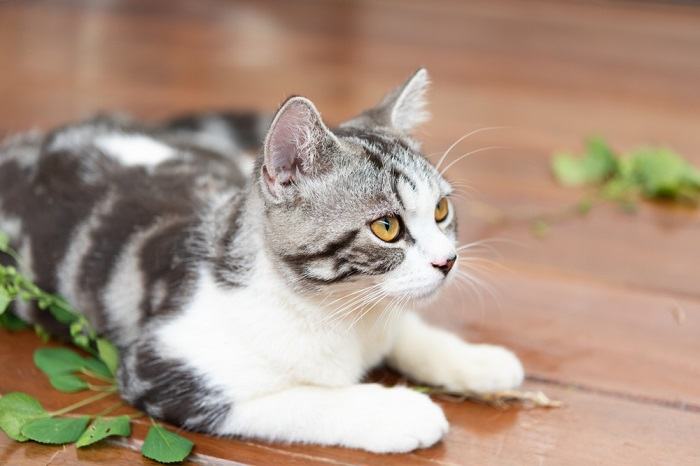
Cats have a sensitive sense of smell, and certain pheromones and herbal diffusers can relax them.
Pheromones are odorless vapors that give cats a sense of reassurance and a feeling of calm, while herbal vapors can sometimes have a calming effect on cats. Diffusers allow these products to be wafted into the atmosphere, so it can help to use these in rooms frequented by hyperactive cats. Be sure to use products specifically formulated for feline use, as some essential oils may be toxic to cats.
4. Create A Cat-Friendly Environment
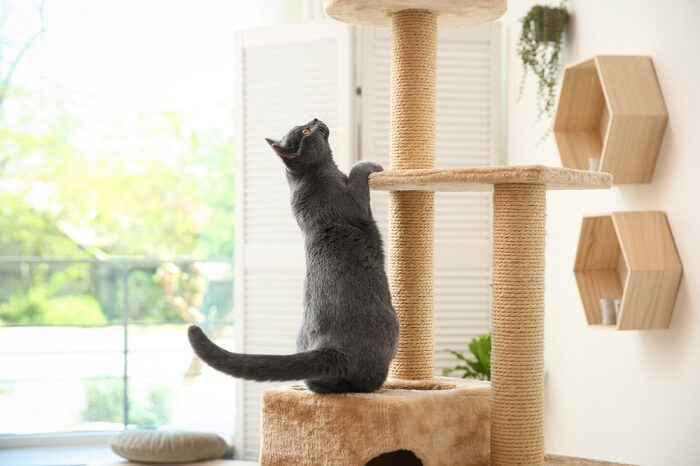
Cats love to climb, scratch, explore and hunt. Creating an environment that allows them to do these things will keep your cat happy and well-behaved.
Cats have a natural urge to express a range of behaviors that they normally carry out outside. These behaviors include hiding, climbing trees, scratching trees, jumping onto walls, running through undergrowth, and hunting. If they cannot carry out such activities, it’s normal that they will feel a sense of frustration, and this pent-up energy can lead to hyperactivity.
It can help to design your home to include areas that allow this type of behavior, such as cupboards, shelving, cat trees, cat gymnasiums, and scratching posts. This kind of setup allows cats to engage in a wider range of activities so that they have a sense of fulfillment, which in turn calms hyperactivity in cats.
You should also make sure that there are enough litter boxes for your home’s cat population (one per cat, plus one extra) in case some sort of cat litter box frustration is leading to agitation.
Also Read: Why Are Cats So Flexible? A Vet Explains
5. Tire The Cat Out With Playing
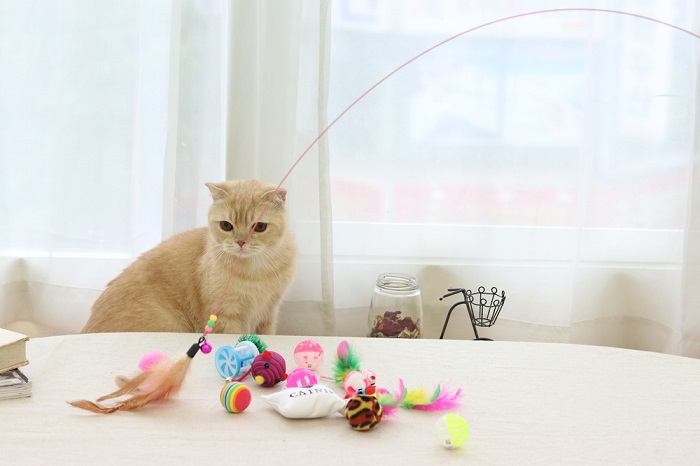
Giving your cat the proper amount of playtime will help balance their behavior between calm and active.
If your cat is still hyperactive after allowing them to entertain themselves in an enriched environment, you may wish to step in with other ways to help them burn up their energy. Active play sessions with cats can include wands with feathery toys attached to a length of line, wind-up toy mice, hiding small food items around the house, and many other options.
My kitten loves toys for a short period of time, and then she gets bored. This is typical, and it makes sense to have a range of cat toys available. When you are done playing with them, put them away and introduce a different toy to keep up your cat’s interest. You may find that they enjoy laser pointers, chasing and pouncing on the spot of light.
They may enjoy cat chews, which are designed to be extra tasty. Catnip can also increase your cat’s engagement with some toys.
Also Read: The 5 Best Catnip Products For Cats (Spray & Toys and More Surprises)
6. Try Gentle, Slow Petting
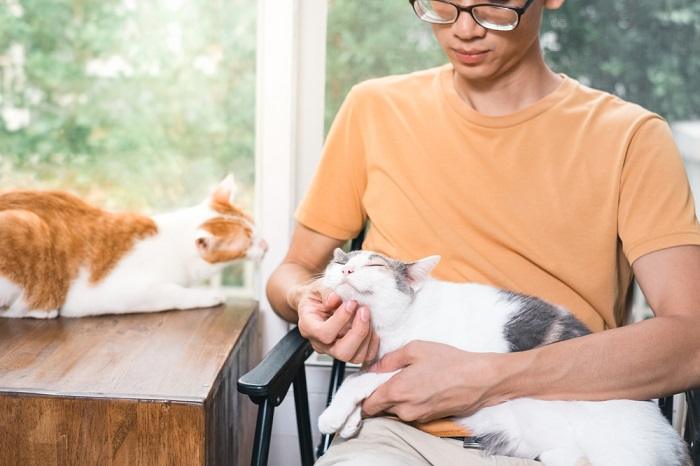
If your cat allows it, calm gentle petting can soothe and calm them.
The alternative approach to active play is to deliberately slow things down. Approach your cat calmly, and encourage them to stay still while you gently pet them. Remember to focus on petting them around the head and shoulders, avoiding their stomachs. Touching a cat on their underside often provokes cats to become more excited and even aggressive.
Cat owners should learn to understand their cat’s body language so that they can tell when a cat is getting fed up with being petted. When a cat is telling you that they have had enough, calmly move away before any agitation begins.
Also Read: How To Pet A Cat – The 3 Basic Do’s And Don’t’s
7. Offer A Meal Of Tasty Food
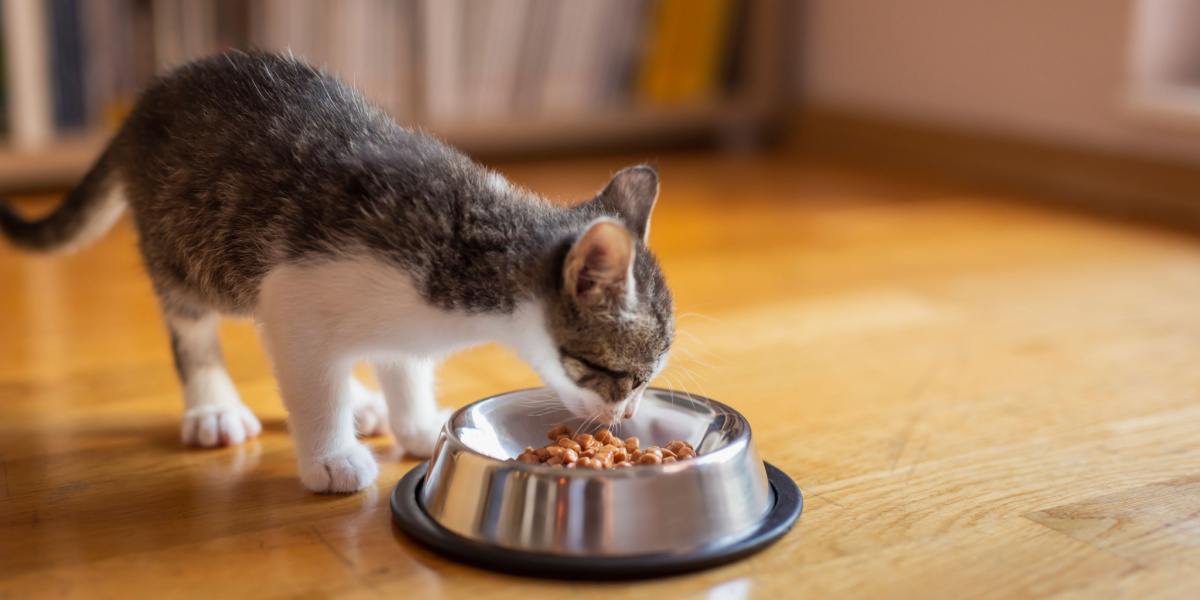
Your cat’s feeding schedule and diet can have a real impact on their behavior.
Periods of hyperactivity can coincide with cats being hungry (perhaps before meals) or if they have eaten some particular types of food, such as foods with certain ingredients or additives. Keep a journal of these episodes of hyperactivity, looking out for any correlation between food and hyperactivity. You may find that if you adjust their feeding schedule and/or the type of food they eat, you can alter their behavior.
There are some nutritional supplements that claim to help cats stay calmer, although there is limited evidence for the efficacy of many of these products.
Also Read: The 10 Best Cat Foods In 2023
8. Use A Heated Bed
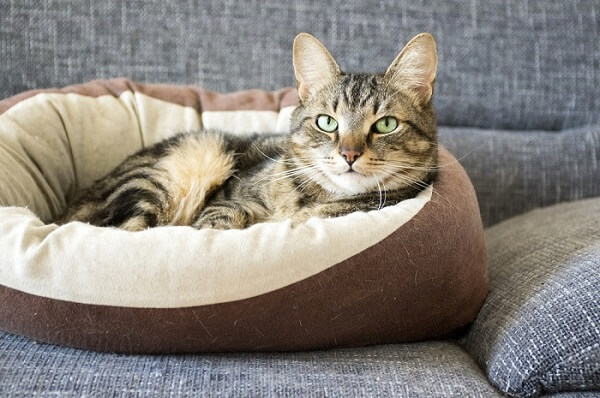
Cats love being warm and cozy, just like us.
Cats love sleeping, and the comfier the bed, the more peaceful they will be. They also enjoy the sensation of warmth. Try a plug-in electric heating pad beneath your cat’s bed, giving them a space to get cozy and get calm.
Also Read: The 12 Best Cat Beds
9. Play Calm Music
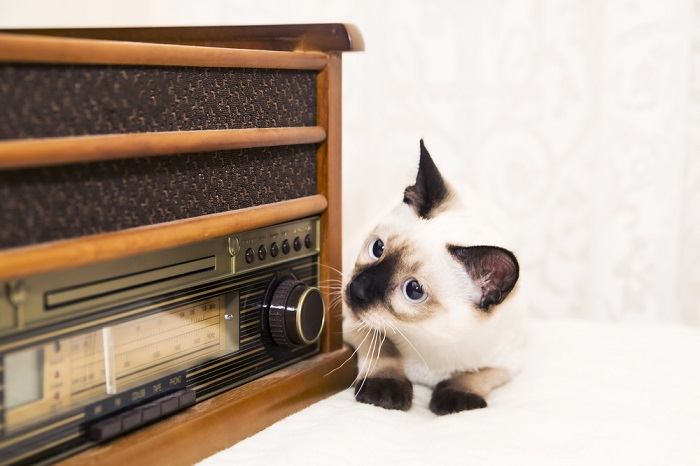
Just like us humans, cats enjoy calming sounds, which can have a positive impact on their behavior.
Cats have sensitive hearing, and they are influenced by the sounds around them, just as humans are. It’s now possible to access calming cat music online (e.g. relaxmycat.com). Check it out and see if your cat is also a music fan!
Also Read: Do Cats Like Music?
10. Talk To Your Vet About Sedatives
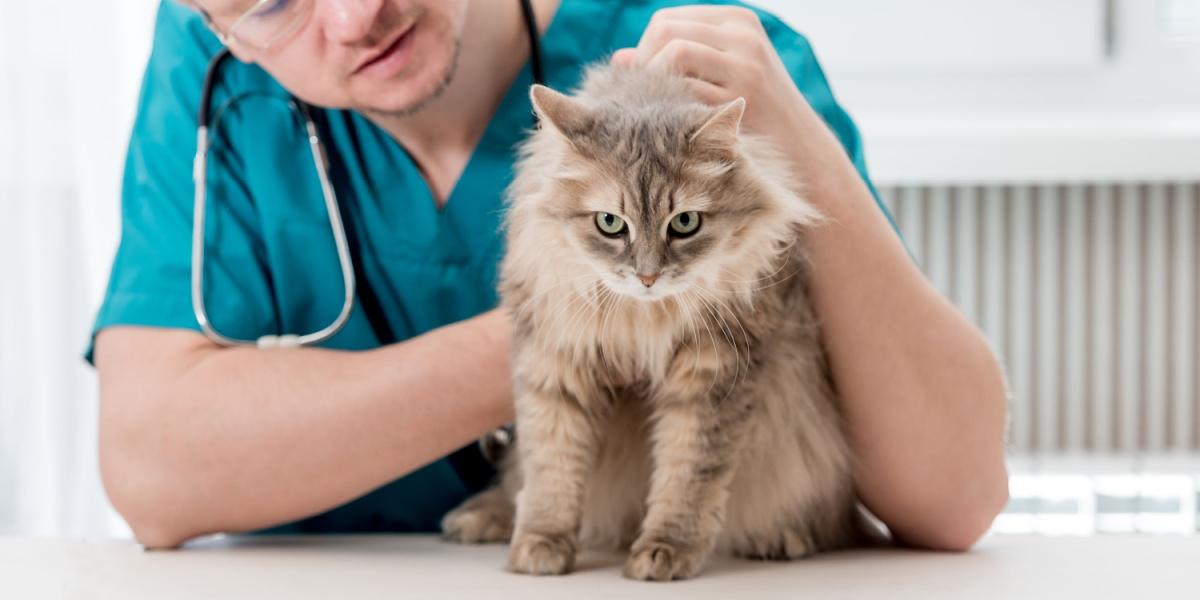
Sedatives prescribed by a veterinarian may help calm hyperactivity in cats, but only as a temporary solution when all else fails.
When all else fails to calm hyperactivity in cats, sedatives can be prescribed by a veterinarian. These should only be used under close professional supervision by your vet, usually in conjunction with behavioral modification training techniques. Sedatives should be considered a temporary way of calming your cat so that they can learn more appropriate ways to behave in the future.
Also Read: Top 10 Things Your Vet Wishes You Knew
Conclusion
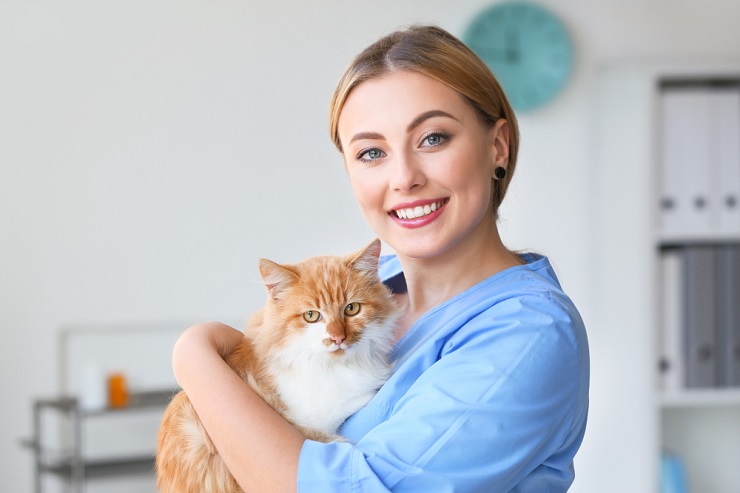
Hyperactivity in cats can create a tense, anxious atmosphere in a home. Taking steps such as those listed above to deal with the hyperactive cat in a constructive way will help not only you, but it will help your cat. A hyperactive cat is often an agitated one who needs a little help to calm down and balance out their behavior.
Also Read: The 7 Best Calming Cat Treats
Frequently Asked Questions
Will my hyper cat ever calm down?
Some cats are genetically more hyperactive than others, but often there are factors that cause them to be more hyperactive. Read through the article above, and to identify reasons why your cat is so hyper, as well as some tips to help you keep your cat calmer.
How do you treat hyperactivity in cats?
A veterinary check-up is important to make sure that your cat does not have a medical reason for hyperactivity, such as hyperthyroidism. Once this has been ruled out, you can try a range of behavioral interventions to try to diffuse the excessive energy in your cat.
Why is my cat always so hyper?
There is a long list of possible reasons, from genetics to illnesses, and from food reactions to boredom. There is always hope to help balance a cat's behavior between calm and active, once the reason behind the hyperactivity is discovered.
 Fact checked by
Fact checked by


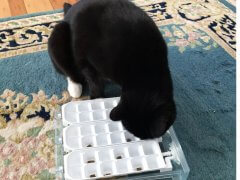

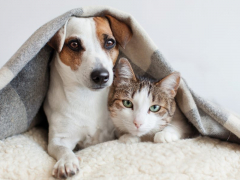

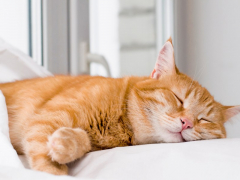
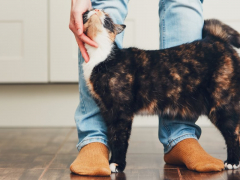
We just inherited a stray orange tabby. He is full of life and will eat anything insight. He will steal from our older cat, who is not a tabby. We have name him Kramer (he reminds us of Kramer on Seinfeld) he moves and dances more than any cat/kitten I have ever seen.
He will eat human food, by grabbing it off your plate. My husband like to sit on the couch and watch TV to eat his dinner. Kramer will come grab it off his plate while he is watching TV. He jumps every where he can, countertop,s, bathroom counter, toilet, bathtub and dressers. I have added shelves above the bed for my older cat and he has taken them over.
I’ve had tabbies before, but not a orange one. Kramer is way different than any of them. He is very cute, but man, he is out of control. He is 6months old and I certainly hope he grows out of this. I will run out of squirt bottles if he don’t.